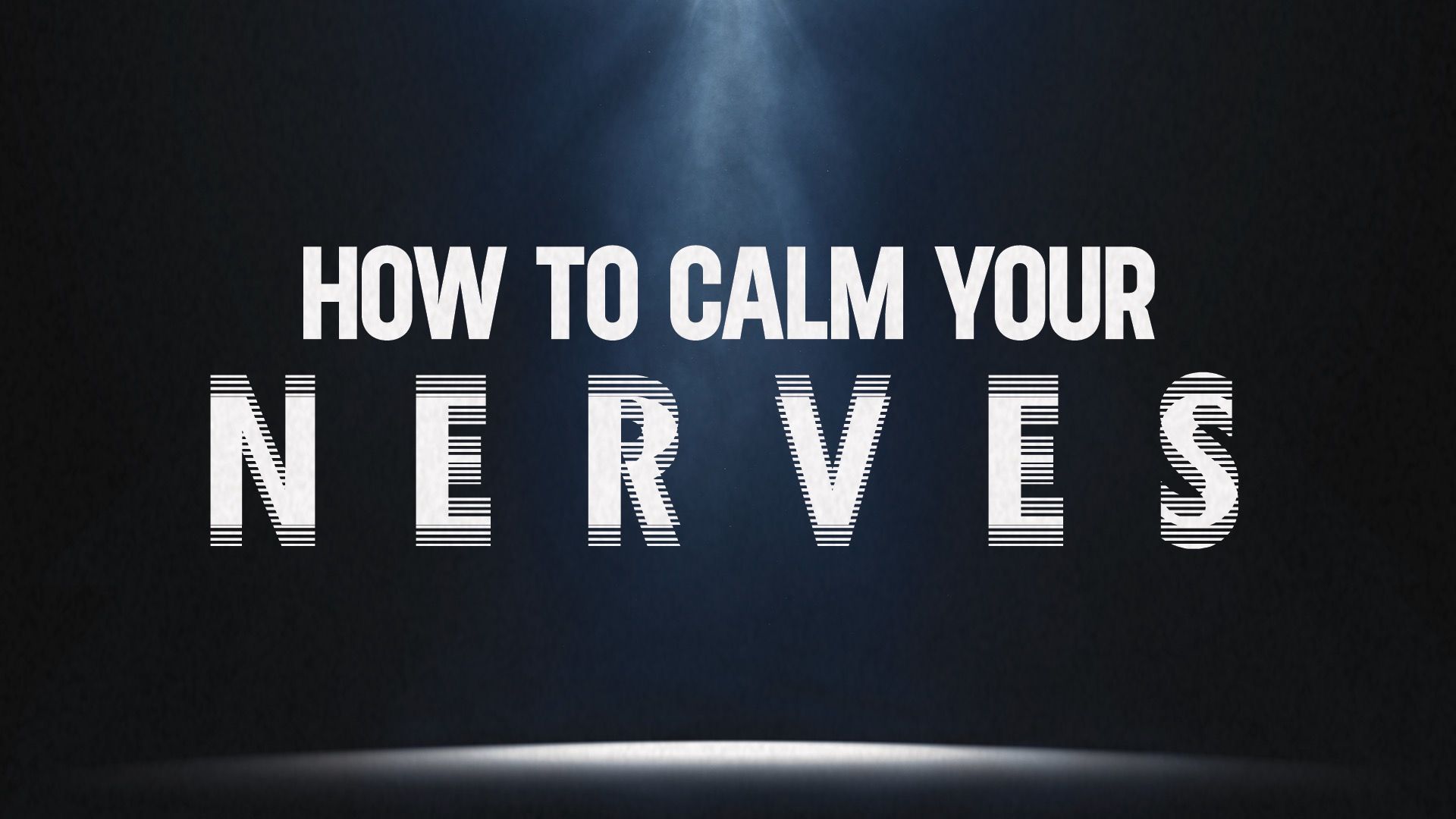Overcoming Stage Fright
Feb 20, 2023
GLOSSOPHOBIA
“Caitlyn, It’s your turn!” my Spanish teacher called. I slowly lifted my head and begrudgingly slipped out of my desk. Trembling, I shuffled up to the front of the classroom. Two dozen seventh graders stared at me, quietly waiting.
My partner said something in Spanish. I froze, staring down at my sweaty hands.
Leaning over, my partner whispered my lines into my ear. I stammered and repeated them back in front of the class. After she confidently said her next line, I again stared blankly, completely forgetting my next line. She continued to feed me my lines throughout our short, yet painful presentation.
After it was over, I hung my head and slinked back into my seat. That day, the fear was crippling.
There are so many things that can spike fear in the heart of any presenter, even a seasoned one.
Glossophobia is the fear of public speaking. This is one of the top fears in the United States, so if you feel nervous before a presentation, you are not alone!
But what makes us so afraid?
Fear is triggered in our brain by a threat. This is why so many people are scared of snakes or spiders. They can hurt you. Fear is triggered in your brain to protect you from getting bitten. But for non-life-threatening situations, fear is often caused by the perceived threat of judgment and punishment.
We have an internal expectation of how we want our presentation to go. For instance, we can have a fear of saying the wrong thing, making a mistake, or “failing”. We fear messing up and having our inner critic heap judgment on ourselves.
There are also perceived external expectations from your audience. What might they do or say if I mess up this presentation? Perhaps they will stop listening, reject my proposal, personally disagree or attack me. We fear disappointing our boss or making a fool out of ourselves. We fear being judged.
OVERCOMING FEAR
Where does this fear of judgment come from?
Somewhere along our life journey, we learned the lie that if we don’t live up to a certain expectation, then we won’t be loved or accepted. We will be judged.
For example, perhaps your mom was a perfectionist and instilled in you that if you left room for improvement, then you didn’t meet the expectation. Or maybe your dad taught you the importance of hard work, but as you grew up you tied hard work with your identity. As a result, anytime something you did failed, you felt like a failure.
If we want to rid ourselves of this fear, then we need to take a deeper look into ourselves to discover what lies we believe that cause this fear. Then we can release the lie and replace it with truth.
Let’s take a look at your life. What causes you to feel fear when you speak in front of a group? What is the lie that you are believing?
For me, I have struggled with believing the lie that I don’t have anything of value to say or offer my audience. That I’m boring, uncool or unwanted. I’m not good enough.
Then ask yourself, who taught you this lie?
When I reflect on the lie that I’m not worth listening to, a memory from elementary school comes to mind. I was on the playground during recess. The sun was shining and usually I would be climbing on the jungle gym, but today I was talking with a friend of mine and her friend (I’ll call her Sarah). Apparently Sarah did not want me to talk anymore. She looked me straight in the eye and angrily told me to shut up. That memory is burned into my mind. That was the first time someone had ever told me to shut up. I was shocked. My friend sadly shrugged her shoulders and they walked away.
So, who comes to mind for you? It’s possible the person that comes to mind is an amazing person who never meant to hurt you or teach you this lie. That’s okay. Many times this is the case, and for whatever reason, our brains interpret their well-meaning words or actions in a way that causes our subconscious to believe this lie.
Take a moment to forgive this person. You don’t need to confront them, unless doing so would be healthy and helpful to your relationship with them. This can simply be a personal exercise that you do. When you have a moment of privacy, release the lie and say out loud, “I forgive _____ for teaching me the lie that I _____.”
For me, this meant saying: I forgive Sarah for teaching me the lie that I didn’t have anything of value to say. I forgive my friend for not speaking up and reinforcing that lie with her silence.
Finally, what is the truth? What is true about who you are? Embrace the truth.
The truth is that even if someone doesn’t think I have anything of value to say, my words encourage and empower other people. The truth is we each have value. What you say matters. Words matter. You matter.
Forgiveness and love are powerful tools to defeat fear. Learning to love others and love ourselves allows us to look beyond judgment. Mature love, genuine care for others and for ourselves, drives out fear.
Now that we’ve begun the internal work to overcome fear, let’s take a look at some practical tools we can use to reduce nervousness when making a presentation.
OTHER PRACTICAL TOOLS
Be prepared. Practice. Know your content inside and out. Practice in front of a mirror. Record yourself giving the presentation and watch it to learn what you can do to improve. If you don’t like listening to yourself speak, then mute the video so you can catch any visual habits that may be distracting to your audience. Join a speaking group like toastmasters, or get a communication coach who will help you fine tune your presentation skills.
The goal is to thoroughly know your content, not memorize it. Some acting strategists suggest rehearsing lines in a variety of positions and locations. Practice giving your presentation standing up in your bedroom, sitting down at a desk, while pushing the swing at the playground with your child. Try balancing on one leg. The more you practice in different positions and settings, especially awkward ones, the more comfortable you will be with your content.
If possible, practice on location with the microphone and lighting. Be familiar with the room setup. Spending time in the place where you will present will help you feel comfortable in that environment. On the day of your presentation, arrive early. Go over your notes. Give yourself a pep talk.
Increase your endorphins. Endorphins are hormones in your brain and nervous system that not only increase feelings of happiness, but also naturally reduce anxiety. When your endorphin levels are high, you are more calm and confident, making you a better presenter.
Exercising the morning before your presentation will boost your endorphins. Strike a quick superhero pose before going on stage. Even smiling before and during a presentation can increase your endorphins. A smile will display a sense of confidence and enthusiasm to your audience.
Stretching can also do the trick. MasterClass suggests, “Spread your arms out to both sides of your body and reach toward the sky before you walk on stage or engage in another form of public speaking. This exercise will naturally enhance your posture and improve your confidence and visual appearance.”
Connect with your audience. Arriving early also allows time to meet and greet your audience prior to speaking. Talking with your audience provides you an opportunity to ask questions to get to know them better as well as make you seem more approachable and likable. This will help break down the metaphorical wall between the audience and stage. It may also provide you with some last minute inspiration for your presentation.
Use stories and a sense of humor to connect with your audience. Laughter is a great tool to get your audience to lean in. Use your nervous energy to your advantage by transforming it into enthusiasm. “Studies have shown that an enthusiastic speech can win out over an eloquent one,” Larry Kim, CEO of Mobilemonkey, explains. “Since I'm not exactly the Winston Churchill of presenters, I make sure that I'm as enthusiastic and energetic as possible before going on stage.”
Slow down. When nerves spike during a presentation, it’s because our instinctual fight-or-flight self-preservation response kicks in, producing a boost of adrenaline. This is helpful in life-threatening situations, but not when speaking in public.
The National Social Anxiety Center recommends, “Practice slowing speech while rehearsing. When we talk quickly, our brain sees it as a threat. Speaking slowly and calmly gives the opposite message to our brain.”
During your presentation, add pauses. Take a moment to slow down and drink water during your presentation. Stand-up comedians and speakers use a water bottle as a grounding tool all the time during their presentations. MasterClass also points out that “water will reduce your dry mouth symptoms and keep you cool and hydrated as you sweat due to the heat of the stage lights.”
Take deep breaths. Controlling your breathing can help you slow down your heart rate and regulate your hormones, helping your mind and body calm down during a presentation. Breathing deeply from your diaphragm, also known as taking big belly breaths, may also improve the sound quality and projection of your voice.
Thinking back to my middle school years, I was terrified of public speaking. But as my confidence in my personal identity grew, my confidence also grew as a speaker. In high school, I performed in black box theater for the first time. In college, I began speaking to large groups of students. My passion for my message and my love for those students far outweighed the anxiety.
No matter if you’re a student presenting in class, a professional pitching a proposal, or a seasoned speaker sharing from stage, there will always be times when those nerves pop up. Using these tools, as well as addressing the root of our fears of judgment and public speaking, will empower you to present with confidence.
By Caitlyn Neel - Certified Life Coach

